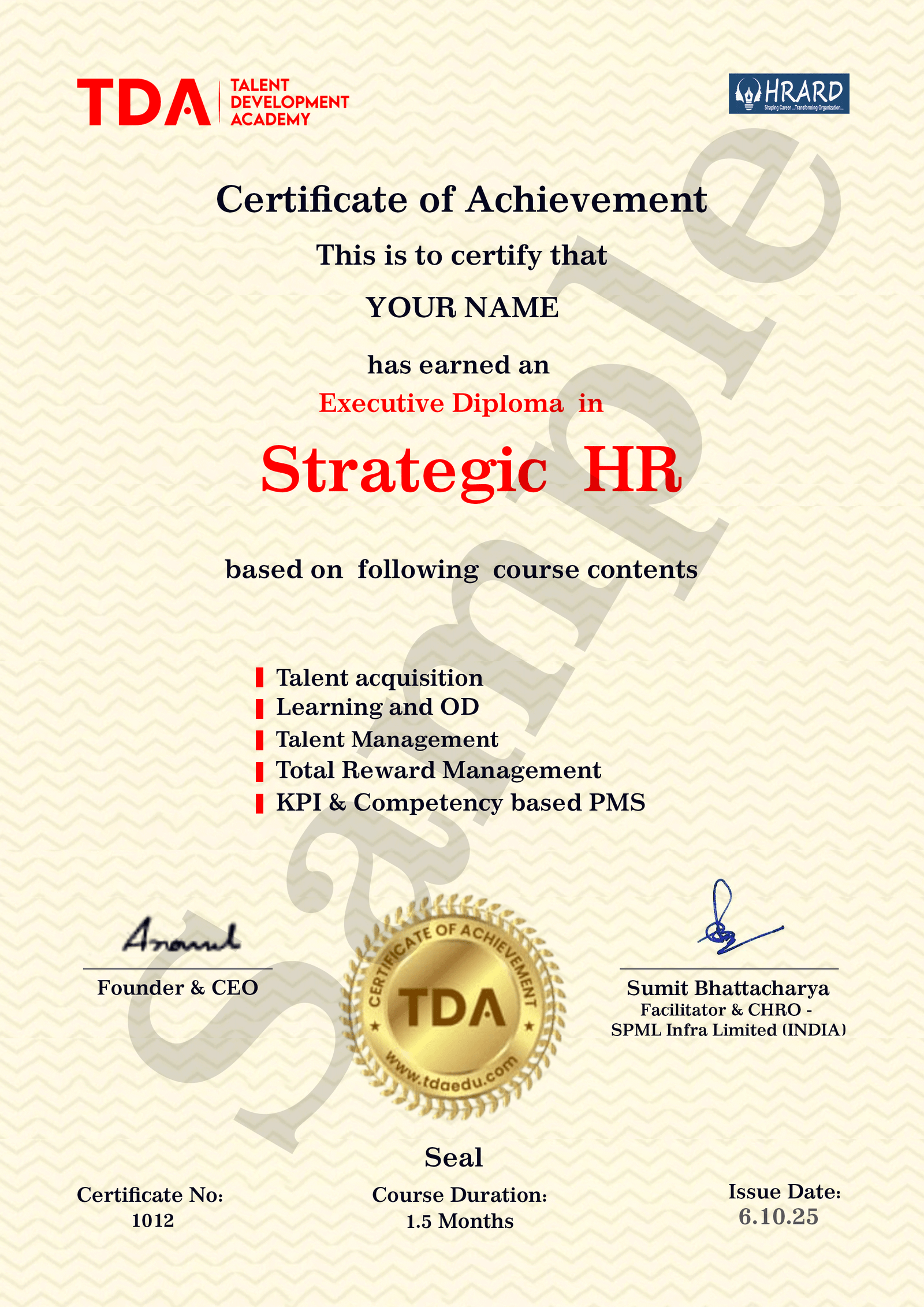HR Six Sigma Specialist for HR Professionals:
Driving Process Excellence in Human Resources
Industry Expert Faculties
Our trainers are highly experienced HR professionals who bring real-world expertise to the classroom.

Dr. SUMIT BHATTACHARYA
25+ Years of HR Experience
Chief Human Resources Officer
SPML Infra Limited - INDIA (The Largest Infrastructure company in South Asia)
"Asia's 100 Most Impactful HR Leaders Award 2025"
Universities connected with University of Minnesota, Yale University, University of Michigan, University of California, University of Toronto, University of Pennsylvania SHRM- USA

- Course Duration: 1.5 Months
- Class Duration: 2 Hours
- Total Session: 8
- Ongoing Batch: Batch 06
- Class Starts: 29 May, 25
- Classes on: Sunday & Thrusday
- Classes Time: 09:00 PM - 11:00 PM
Course Content
Module 1: Introduction to Six Sigma for HR
Objective: Provide a foundational understanding of Six Sigma principles and their relevance to HR.
Overview of Six Sigma: Introduction to the Six Sigma methodology, including its history and key concepts (DMAIC).
Importance in HR: How Six Sigma can be applied to improve HR processes and outcomes.
Roles in Six Sigma: Understanding the roles of Green Belts, Black Belts, and other Six Sigma practitioners in an HR context.
Key Six Sigma Metrics: Introduction to metrics like Defects Per Million Opportunities (DPMO) and Sigma levels in HR.
Module 2: Defining HR Problems and Opportunities
Objective: Teach HR professionals how to define and scope HR-related problems using Six Sigma tools.
Problem Identification: Techniques for identifying HR process inefficiencies and opportunities for improvement.
Project Charter Development: Crafting a clear and concise project charter that aligns with business goals.
Voice of the Customer (VOC): Gathering and interpreting customer (employee) feedback to define project goals.
Critical to Quality (CTQ): Identifying key HR factors that are critical to the quality of outcomes.
Module 3: Measuring HR Processes
Objective: Equip HR professionals with tools to measure and analyze current HR processes.
Process Mapping: Creating detailed process maps to visualize HR workflows and identify bottlenecks.
Data Collection Techniques: Methods for collecting and organizing data relevant to HR processes.
Descriptive Statistics in HR: Using statistical tools to analyze HR data (mean, median, mode, standard deviation).
Baseline Measurement: Establishing a baseline for current HR process performance.
Module 4: Analyzing HR Process Data
Objective: Provide skills to analyze HR data and identify root causes of process inefficiencies.
Root Cause Analysis: Techniques like the 5 Whys and Fishbone Diagram to identify root causes of HR issues.
Pareto Analysis: Applying the 80/20 rule to prioritize issues that have the most significant impact on HR outcomes.
Correlation and Regression Analysis: Exploring relationships between different HR variables and their effects.
Hypothesis Testing: Conducting tests to validate assumptions and hypotheses in HR scenarios.
Module 5: Improving HR Processes
Objective: Guide HR professionals through the process of designing and implementing process improvements.
Brainstorming Solutions: Facilitating effective brainstorming sessions to generate potential solutions.
Lean Tools for HR: Introduction to Lean concepts like 5S, Kaizen, and Value Stream Mapping in HR.
Piloting Improvements: Planning and executing pilot programs to test process improvements.
Change Management: Managing organizational change effectively during the implementation of process improvements.
Module 6: Controlling HR Processes
Objective: Teach methods to sustain improvements and control HR processes over time.
Control Plans: Developing control plans to maintain process improvements.
Statistical Process Control (SPC): Using control charts and other SPC tools to monitor HR processes.
HR Dashboards: Creating HR dashboards to track and report process performance metrics.
Continuous Improvement: Establishing a culture of continuous improvement within the HR function.
Module 7: Six Sigma Project Implementation in HR
Objective: Provide a step-by-step guide for implementing Six Sigma projects within HR.
Project Selection: Criteria for selecting HR projects suitable for Six Sigma implementation.
Project Management Techniques: Tools and techniques for managing Six Sigma projects in HR.
Case Studies: Review of successful Six Sigma projects implemented in HR departments.
Lessons Learned: Analyzing common challenges and best practices in Six Sigma project implementation.
Module 8: Advanced Six Sigma Tools and Techniques for HR
Objective: Explore advanced Six Sigma tools and techniques applicable to HR professionals.
Design of Experiments (DOE): Applying DOE to test multiple variables in HR process improvements.
Failure Mode and Effects Analysis (FMEA): Identifying and mitigating risks in HR processes.
Benchmarking: Using benchmarking to compare HR processes against industry standards.
Simulation and Modeling: Using simulation tools to predict the impact of changes in HR processes.
Module 9: Project Presentation
- - Make real life project presentation using modules
Registration Now

Milestones and
Achievements
Highlighting our impactful accomplishments and successful milestones with meaningful metrics.


